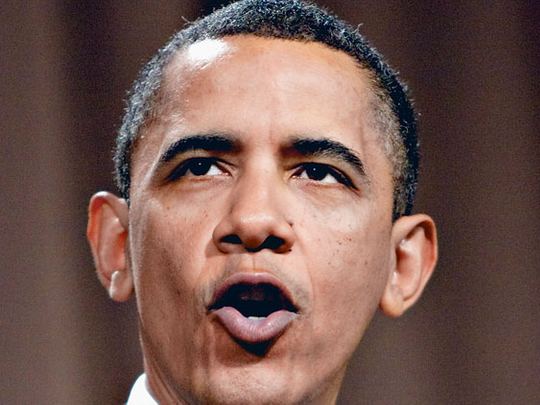
Once again, the Obama administration looks increasingly besieged by a host of domestic crises, foreign challenges and doubtful disenchanted voters at home and a disillusioned and dismayed world which is yet to see US President Barack Obama deliver on his grandiose promises. No wonder then that Obama's report card after a year and half is not impressive and leaves a lot to be desired.
Obama's White House is increasingly feeling the heat of US domestic politics, with the Republicans ganging up on him, eying the crucial midterm election next November to regain at least the House of Representatives, which makes the Democratic Party leadership nervous. Add to that the results of the nasty polls which show a majority of Americans losing faith in his leadership or his capacity as president to make the right decisions. During the latest Washington Post-ABC News poll, asked how much confidence they had in Obama to make the right decisions for the country's future, 58 per cent said "just some" or "none."
The results of the poll are a reversal of what voters said at the start of Obama's presidency 18 months ago when about 60 per cent expressed confidence in his decision-making.
This is indicative of the difficulties Obama has faced on many domestic and foreign fronts. The economy is still wobbly, the deficit is at all time high, the 9.5 per cent unemployment rate, the controversial health care reforms, the BP oil spill — all have dealt Obama a major blow.
Laundry list
Adding to this laundry list of failures, the quagmire in Afghanistan, the showdown over Iran's nuclear programme and the loud drums of war that are beating again, the flip-flop and back-peddalling over the US commitments and wavering over reining in Israel and thus squandering the possibility of achieving the long overdue breakthrough in the mother of all challenges in the Middle East, and there you have it — a less than average report card for the first year and a half of the Obama presidency. This has eroded much of the confidence that Obama gained after his Cairo speech to the Muslim World in June 2009.
A Pew Global Attitudes Survey published last week shows Obama is less favourably viewed in the Muslim world than a year ago. A year after Obama's groundbreaking Cairo speech, in which he spoke to the world's Muslim communities, the new survey finds a drop in the numbers favouring America in Muslim countries.
Major factors in the soured opinions, analysts say, are disappointment in the perceived lack of follow-through on Obama's call for better Western-Muslim relations and lingering disagreement with the US military's intervention in Muslim countries.
"The lack of support [for the United States] in the Muslim world is coincident with the wars in Iraq and Afghanistan," said Andrew Kohut, president of Washington's Pew Research Center, which conducts the annual survey. There's also "disappointment" among Muslims about the US under Obama. Many have a perception that the US still "does not deal fairly" in the Israeli-Palestinian conflict."
Choppy polls
These messy and less than bright results are taking their toll on Obama himself and his party, as they face the rundown towards the choppy midterm election next November, which Obama and his party are reading with a lot of worries and apprehension.
I think what the strategist Zbigniew Brzezinski, Carter's former national security adviser said on Morning Joe, a few days ago, is telling. "There is a sense of pervasive malaise" in America. What's worse, suggested Brzezinski, Obama hasn't been able to figure out how to deal with the malaise. Can you hear the wailing and gnashing of teeth emanating from 1600 Pennsylvania Avenue? It's Obama & Co. reacting to Brzezinski pinning on Barack Obama the word that doomed Jimmy Carter: ‘malaise'.
Obama is looking more and more like a fighter on the ropes. Tip O'Neill, the legendary Speaker of the House of Representatives once coined the phrase "All politics is local". Lobbyists, pressure groups, and foreign governments, friends and foes of the US, got the message and have exploited this brutal fact to their advantage.
The challenge is to see how this siege will play out affecting the US and the world. To make things worse, the US is losing its dominance in world affairs because of the rise of others and constraints and pressures at home. The US is in for a rough ride — and so is the rest of the world!
Dr Abdullah Al Shayji is the Chairman of the Political Science Department, Kuwait University.










